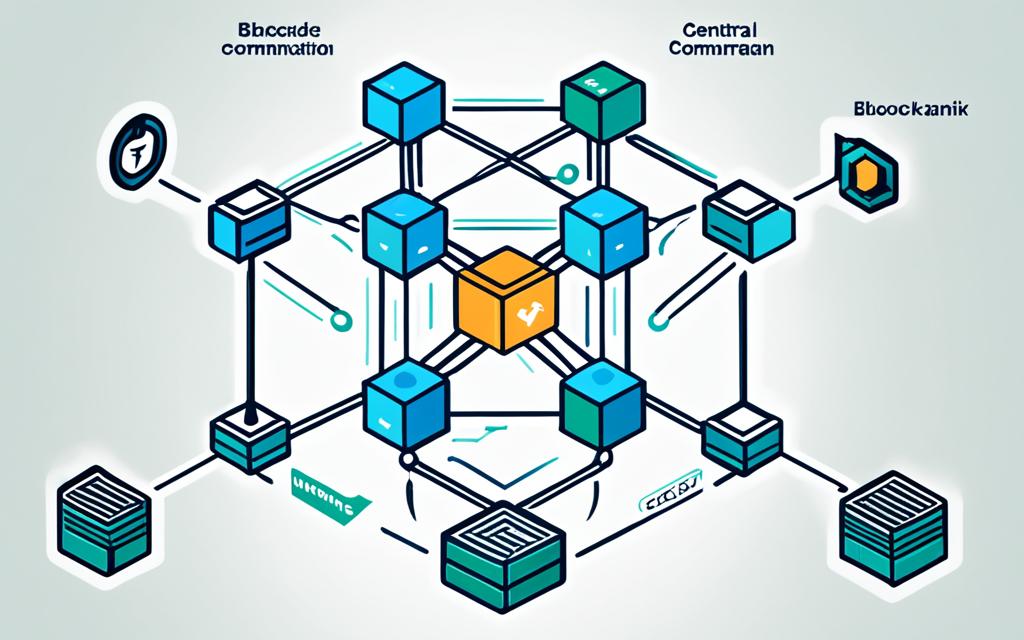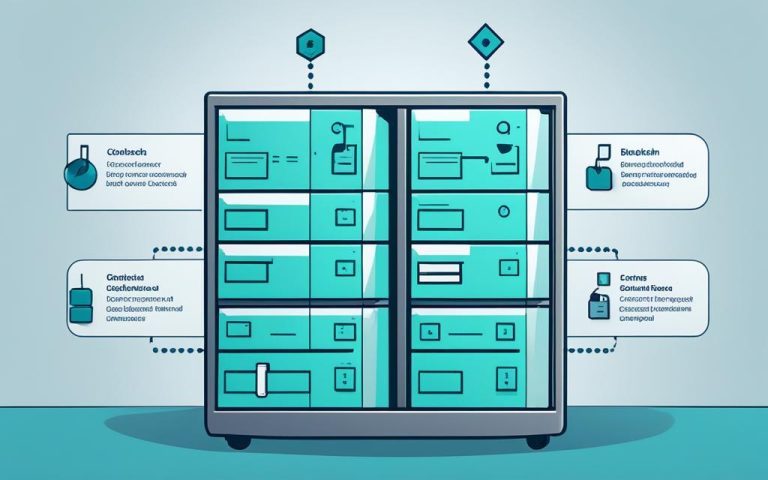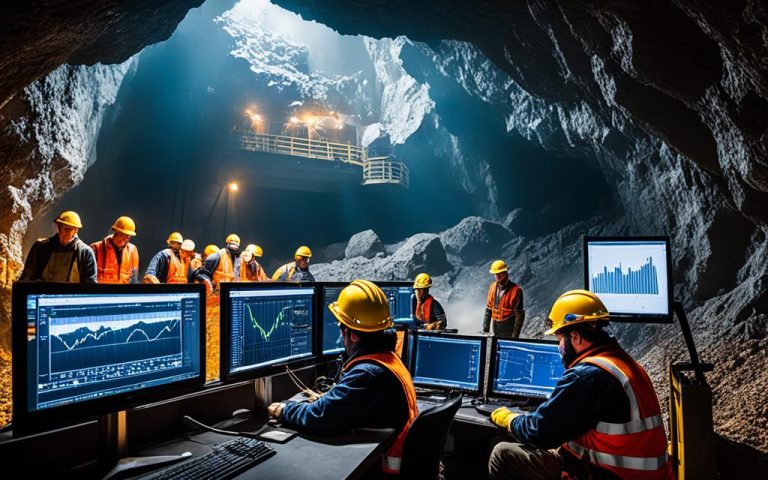A blockchain node is a device that takes part in a blockchain network. This is usually a computer. It runs the software for the blockchain protocol. This helps validate transactions and keep the network safe.
Nodes let the network stay connected. The more nodes there are, the less central control there is. This makes the network stronger.
Nodes are key to keeping the network safe. They check transactions and keep the network honest. Without nodes, the trust in blockchain and cryptocurrencies would diminish.
Blockchain technology has changed many industries. It provides a safe, open, and non-central way to store and check data. Knowing about blockchain nodes is key as this technology grows.
How Does a Blockchain Node Work?
A blockchain node plays a crucial role in keeping a blockchain network running smoothly. It has two main jobs: spreading and checking transactions. This helps make the network secure and dependable.
When someone starts a transaction, a blockchain node gets it first. Then, it sends the transaction to all other nodes. This way, everyone in the network gets the information. Spreading out transactions stops any single point of failure.
Nodes work together to check the transactions. They look at different parts of the transaction. For example, they check if the person sending money has enough of it. This stops fake or unauthorized transactions from getting through.
For a transaction to be accepted, most nodes must agree it’s valid. In many networks, like Bitcoin, this means over half the nodes must say yes. With so many nodes, it’s rare for a fake transaction to be accepted.
After validation, transactions are put into blocks and added to the blockchain. The blockchain is like a public notebook that keeps all transactions in order. Each block connects to the one before it, creating a chain.
A blockchain node takes an active role in the network. It validates and shares transactions. By spreading tasks among many nodes, blockchain technology brings transparency, safety, and trust to our digital world.
Not all blockchain networks work the same way. For instance, Bitcoin blocks are made through mining. Miners are special nodes that solve hard math problems. The first miner to solve the problem gets to add a new block. Mining secures the network and validates transactions.
It’s key to understand how blockchain nodes function to see what blockchain can do. By working together, blockchain nodes can change industries like finance, supply chains, healthcare, and more.
The Role of Node Reputation in Blockchain Networks
Nodes also build a reputation in the blockchain network. Reputation systems mark nodes as trustworthy. They use methods like proof of stake or proof of work to judge a node’s work and reliability.
| Advantages of Blockchain Nodes | Challenges Faced by Blockchain Nodes |
|---|---|
|
|
Types of Nodes in Blockchain
In a blockchain network, various nodes maintain the network and help with transactions. These nodes are essential for blockchain’s decentralized setup. We will look at some main types of nodes.
Archival full nodes keep the whole blockchain ledger, from the start to the latest transactions. They need a lot of memory to store every block and transaction independently. This makes the blockchain reliable and secure for checking transactions anytime.
Pruned full nodes manage their memory by removing old blocks. They save the newest transactions up to a set limit. These nodes balance the need for storage efficiency and transaction validation.
Light nodes are for devices with little storage, like smartphones. They download only block headers. For more complex tasks, they rely on full nodes. Light nodes are popular because they are easy to use.
There are also masternodes, mining nodes, authority nodes, staking nodes, and lightning nodes. Each type plays a unique role in the blockchain’s security, efficiency, and decentralization.
FAQ
What is a blockchain node?
A blockchain node is typically a computer that joins a blockchain network. It uses special software to validate transactions and keep the network safe.
What are the main roles of a blockchain node?
Blockchain nodes have two key jobs: broadcasting and checking transactions. They receive transactions from users, then share them with the network. Each node works to confirm that a transaction is valid and the sender can pay.
How does a blockchain node contribute to network security?
Nodes are vital for the security of the blockchain. They check transactions and ensure they’re legitimate. By adding transactions to the blockchain, they make the network trustworthy and secure.
What are the types of nodes in a blockchain network?
Blockchain networks have various nodes, such as archival full nodes, pruned full nodes, and light nodes. There are also masternodes, mining nodes, authority nodes, staking nodes, and lightning nodes. Each has its own role and responsibilities.
What is the role of archival full nodes in a blockchain network?
Archival full nodes keep a complete record of all transactions. They make sure past transactions can be checked and help validate new ones.
What is the function of pruned full nodes?
Pruned full nodes save recent transactions to a set limit. They use less space than archival nodes but help keep the blockchain secure and verified.
How do light nodes operate in a blockchain network?
Light nodes store only the headers of blocks. They depend on full nodes to process transactions. This makes them ideal for less powerful devices.
What is the role of masternodes in a blockchain network?
Masternodes check transactions and help maintain the chain. They can’t add blocks but perform unique tasks in some networks, like quick transactions or ensuring agreement.
What do mining nodes do in a blockchain network?
Mining nodes solve complex math to confirm transactions and secure the network. They are crucial for adding blocks to the blockchain.
How are authority nodes selected in a blockchain network?
Authority nodes are chosen by the blockchain’s leaders or its community. They have to go through a selection process. Their job is to keep the network safe and running smoothly.
What is the role of staking nodes in a proof-of-stake system?
In proof-of-stake systems, staking nodes store cryptocurrency as a security deposit. They help confirm transactions and support the blockchain’s operation and security.
What is the function of lightning nodes in a blockchain network?
Lightning nodes manage transactions outside the main blockchain. They make transactions quicker and cheaper. This helps the main blockchain work without getting too crowded.



















